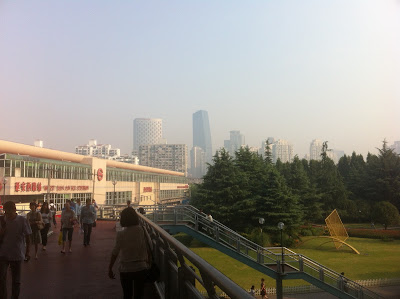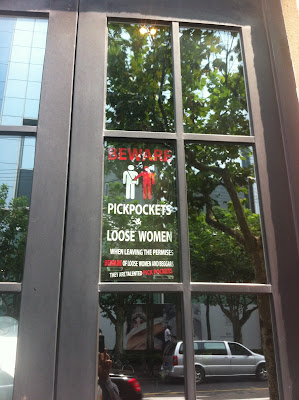Pearls of sweat begin to speckle the faces, and weave
between the wrinkles of the men on the stone walkway overlooking the
river. The sun, barely peeking
over the horizon and through the magnificent metallic monstrosities on the
eastern bank of the river, is already having an impact on the early
morning. The men, quite practiced
at their ritual, aren’t bothered by the heat; they expunge the weighty,
cumbersome granules of their souls through perspiration. Their arms move, rhythmically, through
the thick, humid air, as if on strings manipulated by the master of a
marionette theater. They harness
their energy, their qi, and shepherd it
through their nimble, grizzled bodies.
From their fingertips they feel their blood pulsating. Embracing longevity, health in old age,
the men face the rising sun respectfully, and practice their taiji.
The
stone walkway wraps around the riverbank, a famous remnant of the
international, eclectic history of the area. Accompanying the old men, who make their pilgrimage to the
embankment daily for taiji, are those
who cannot afford the luxury of taiji. Some sleep against the
stone walls, enjoying the last few hours of the spot before the tourists come,
and the police chase them away.
Others, who still have the energy to fight the currents of their tidal
poverty, wearily set up their merchandise carts, hoping that today will bring
them more luck than the day before.
They are all long-faced and bleary-eyed; the little good humor and
energy that they have left must be corralled for the long day of nagging and
haggling with prospective customers.
Some of them keep an eye on their children, who often participate in the
business, by trying to appeal to a sense of pity from the passersby. One toddler is being roused by his
mother. He has a hole in the seat
of his tiny pants, so that he need not remove them when he goes to the
bathroom.
Despite the old men, the homeless,
and the bedraggled merchants, the winding walkway is quite deserted. The stately buildings across the
street, which, along with the embankment, will be teeming with traffic in a
matter of hours, are dark. Even
the street cleaners are few and far between; their work was finished the night
before. For a few hours, after the
night crowd stumbles into cabs, the city sleeps. Invariably, the masses will return again this morning. But, first, time for the day to begin,
a time, the only time, for time itself, to palpably unfold, in this city of
consistent effervescence. The sun
continues its journey up along the eastern sky, now glittering down on the
Huangpu River that separates this, the old part of the city, from the new. This is the Bund; Shanghai, at dawn.
*******
A few days after I returned home from Shanghai from my summer abroad in 2008, I sat down determined to write something. I had been keeping a journal of my day to day life in China, but I really wanted to produce something a little more ambitious than just a travel journal. So I started to write about the first memory I thought about. I didn't think much; just focused on the image and wrote. What I produced in that initial post-China free-write was the above vignette, describing the scene on the Bund one morning when my friends and I decided to participate in a favorite tradition of Shanghai's youth, both native and tourist: staying out until the sun rises over the Bund.
Looking back on it now, I regret not taking pictures of that early morning on the Bund. Watching the sun rise, combined with the many other days and nights I spent walking that stretch of riverbank during the summer of 2008 left me with the Bund as my most lasting visual memory of China (or, at least of Shanghai.... I suppose the Great Wall would probably give the Bund a run for its money).
Which is why I thought it was strange that I hadn't yet made it there yet this time around, a month into living here. It was a beautiful early fall day here in Shanghai today, so I decided to break that trend and get back to the Bund. It wasn't dawn -- I do hope to revisit that tradition at some point while I'm here, at least to get those pictures I didn't get last time -- but it was nice to be back to that place that, for whatever reason, has become the first set of images I see when I've thought of Shanghai these past four years.
For those that don't know, the Bund comprises a stretch of Zhongshan Road on the western bank of the Huangpu River. Its name comes from a Hindi-Urdu word that means 'embankment' (thanks, Wikipedia!). In Chinese, it's called 外滩 (waitan), which literally can be translated to mean 'foreign bank'. I particularly like that translation -- even though I can't say with certainty that this is actually the derivation of the area's name, it does reflect the international flavor of the area's history. The Bund has become one of Shanghai's hottest tourist spots, primarily for its views of Pudong, the eastern section of the city which, in the last two decades, has become the center of Shanghai's business world. The Bund also sports famous architecture, as old banks and trading houses from the late 19th and early 20th centuries still stand proud up and down Zhongshan Road.
Anyway, I wasn't about to make the same mistake I made that early morning on the Bund: I took plenty of pictures today. Here are a few of them:
This is Chen Yi, the first mayor of Shanghai after the Communist Revolution in 1949. When it comes to honoring political officials, Communist China really doesn't do small....
These are a few shots looking down the Bund's stone pedestrian walkway. The river is to the left, Zhongshan Road is to the right.
Two examples of the architecture that contributed to the Bund's famous place in Shanghai geography. Both of these buildings are banks, or at least used to be. Some of Shanghai's swankiest night clubs and restaurants now occupy some of the old buildings on the Bund, though I don't think there are any in these two. I could be wrong though.
This is, in my mind, one of the coolest part about Shanghai: the skyline of Pudong's Lujiazui business district. The funny looking building to the left is the Oriental Pearl TV Tower, Shanghai's tallest structure and one of the tallest in China. You can go up to the top, but I think you have to take out a mortgage it's so expensive. It's way smarter to sneak up one of the other tall buildings, in order to see Shanghai from above.
The jagged, shorter building in the middle here is the Jinmao Tower, one of the first skyscrapers to be built in Pudong. It's overshadowed by the Park Hyatt hotel, which, when it opened, was the world's tallest hotel. I'm pretty sure the Burj Dubai now has that distinction.
And then there's lil ol me. The second picture was taken after I walked through part of Shanghai's old city. You can see the Pearl Tower in the background to get a sense of where I was. An eager Chinese girl first asked me to take a picture of her, which I did, and then basically demanded that she take several pictures of me in order to make it fair.














































